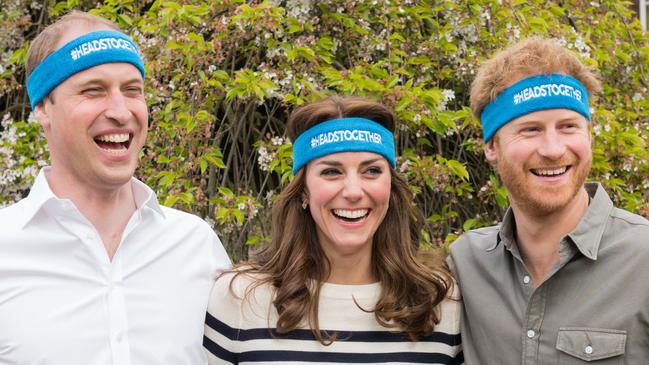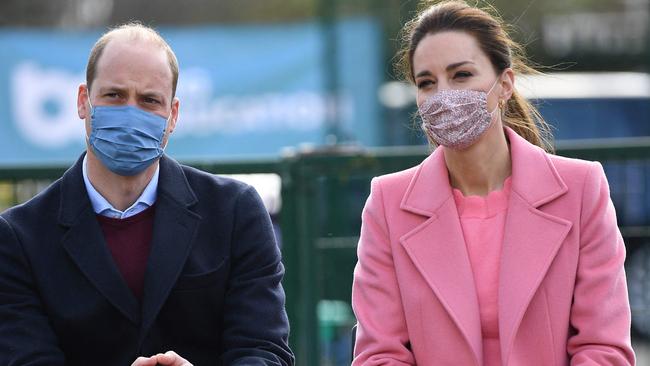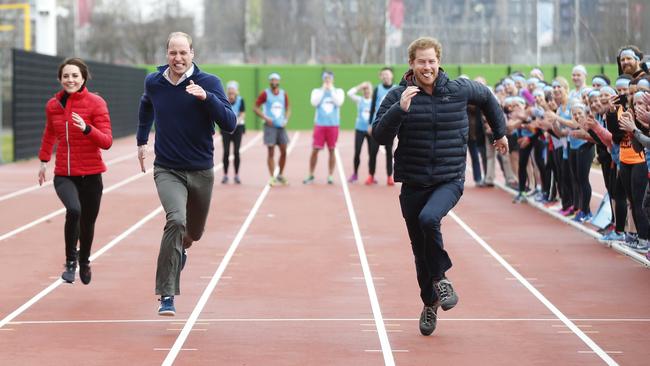William and Kate’s mental health advocacy at risk after Meghan and Harry’s historic Oprah interview
Years of work could be undone after Prince Harry claimed the royal family had failed to provide support for he and Meghan Markle during their most desperate hour.
Royals
Don't miss out on the headlines from Royals. Followed categories will be added to My News.
Of all the damning revelations to emerge from Prince Harry and Meghan Markle’s bombshell interview with Oprah Winfrey, claims of failed mental health support could inflict the most long-term damage to the monarchy.
Aired amid allegations of racism and internal family politics, Markle told Winfrey she had experienced suicidal ideations during her pregnancy, and said that when she sought help from the palace and asked to “go somewhere” to seek treatment, she was told, “that I couldn’t, that it wouldn’t be good for the institution’.”
Prince Harry, who has spoken openly over the years about his own mental health challenges, backed his wife, describing the situation as “desperate” and telling Winfrey, “I went to all the places which I thought I should go to, to ask for help. We both did.”

Both the Duke and Duchess of Sussex are resolute that their cries for help (Markle admitted to feeling “ashamed” for needing support), not only did not receive it, they were actively discouraged.
While the royal family are yet to respond to that specific allegation, the claim threatens to undo years of work undertaken by Prince William and Kate Middleton.
For years, the Duke and Duchess of Cambridge have publicly championed mental health and encouraged people to speak up and seek help in a bid to destigmatize the all too common experience.
Of all their charity work, this specific cause has been fundamental in positioning themselves as ‘modern royals’ who, despite living in palaces and having access to unimaginable wealth, understand the challenges of the world today.
At the centre of this work is Heads Together, a coalition of leading UK mental health charities organized from within Kensington Palace. Before the separation of their households, Prince Harry had played a pivotal role in promoting Heads Together alongside William and Kate.

In 2017, as part of the promotion for Heads Together, Prince Harry shared that he had been “very close to a total breakdown on numerous occasions,” and admitted that he had sought psychological help to process the loss of his mother almost 20 years after he death.
“My brother – god bless him – has been an enormous support,” Harry said at the time, later admitting William told him, “you really need to deal with this. It is not normal to think that nothing has affected you.”
As part of the same campaign, Prince William said, “Talking to someone else is a positive and confident step to take – but for too long it has been a case of ‘keep quiet and carry on.’ As a result, too many people have suffered in silence for too long, and the effects can be devastating.”
Middleton agreed, saying, “The challenge that so many people have is not knowing how to take that first step of reaching out to another person for help … Fear or reticence, or a sense of not wanting to burden another, means that people suffer in silence, allowing the problem to grow larger and larger unchecked.”

Following the Oprah interview, former special forces soldier Dean Stott, who attended Prince Harry and Meghan Markle’s wedding summarized the problem to BBC 4 Radio, saying, “One thing that really stood out to me in this interview and was quite disturbing was the fact that Meghan, who was very vocal about her mental health and no one was offering her any support within the institution. This is an institution, mind you, that has a foundation which raises money for mental health. I raised £900000 for the royal foundation on mental health and they can’t even deal with one of the own members of the family.”
The alleged failure to support Meghan Markle in her time of need suggests that despite years of campaigning, listening, spotlighting and promotion, the royal family is failing to practice what it preaches. It sends the message that the new generation of royals – who many see as the last hope for the monarchy – are perhaps no different from the last.
And if William and Kate cannot differentiate themselves from the unrelatable old guard – who are largely seen as a bad and out of touch bunch – it spells disaster for the future of Queen Elizabeth’s decades of hard work.
More Coverage
Originally published as William and Kate’s mental health advocacy at risk after Meghan and Harry’s historic Oprah interview




